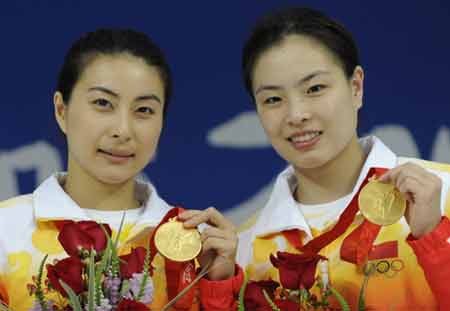(The author, features writer for Sports Illustrated's Chinese-language edition published in Beijing)
 You have to admire the handwork that's gone into some of China's gold-medal performances in Beijing. China has put up winning margins so large in diving and gymnastics that the rest of the field was left to compete for silver and bronze.
You have to admire the handwork that's gone into some of China's gold-medal performances in Beijing. China has put up winning margins so large in diving and gymnastics that the rest of the field was left to compete for silver and bronze.
On Sunday, Guo Jingjing and Wu Minxia had the three-meter springboard synchronized event locked up after three of five rounds. The women's ten-meter synchro event was a clinic; Wang Xin and Chen Ruolin took gold with a gargantuan margin of victory (31.68 points). That came on the heels of China's men's gymnastics team, which won team gold with such a dominant performance, the point spread between first and second place (286.125 to 278.875) was more than between second and eighth (272.875).
When I think of the stunning accuracy of the moves of Guo Jingjing, or the consistency of Yang Wei, or the perfect landings that Xiao Qin, Li Xiaopeng, and the rest of the Chinese men displayed in impossibly difficult routines on Tuesday, I remember my visit to the Tsinghua University Natatorium in the summer of 2006.
On that trip I met Yu Fen, the legendary diving coach who squired Fu Mingxia to gold-medal glory in Barcelona, Atlanta and Sydney (the last after Fu had begun university studies).
On the day we met, Coach Yu was training her diving club students. The athletes I saw ranged in age from around six to eleven or twelve – young kids with potential, nobody who had yet reached anything close to world-class range.
 Guo Jingjing (L) and Wu Minxia hold their gold medals during the medal ceremony for the women's 3 meter springboard synchronised diving final at the National Aquatics Center in the 2008 Beijing Olympic Games on August 11, 2008. [Agencies] Guo Jingjing (L) and Wu Minxia hold their gold medals during the medal ceremony for the women's 3 meter springboard synchronised diving final at the National Aquatics Center in the 2008 Beijing Olympic Games on August 11, 2008. [Agencies] |
I watched and admired the way her youngest athletes – who, by the way, are required to do well in school to stay in the club, a model that's being used more and more in China today – would work on the most basic fundamentals of diving.
The turned-in toes, the hand position, the straightness of the body. The attention to the most basic skill. Six-year-old divers at the Tsinghua Natatorium aren't allowed to dive in any way. All they are allowed to do is jump feet-first into the water, feet in that perfect position, arms stretched overhead. Diving head-first comes later.
Look very closely at Guo Jingjing and the rest of China's spectacular diving team, and you'll see that very foot position, that very hand position. The first thing you learn is how to enter the water. Fundamentals. Precision. They're good when they're Olympians because they learn good habits when they're six.
The training process to create that precision is sometimes mind-numbing. The Chinese system can seem rote and boring, but the point is to create muscle memory that can compete in the insane pressure of an Olympic final.
It reminds me of how I learned Chinese eight years ago at Beijing Normal University. Foreign students studying Chinese can expect to write hours of characters, over and over again, locking in the stroke order so that every character can eventually be recognized with a single glance. Writing "ting-xie" ("listen and write" quizzes), the Chinese equivalent of a spelling test, tests the skill of remembering characters, many of which are exact homonyms, so context is everything. It made my brain hurt.
Learning Mandarin was one of the hardest things I've ever done. But when I think of those ting-xie, the discipline, the dedication required to learn Chinese, I think back to Yu Fen and the turned-in feet and perfect hand positions of the six-year-olds who weren't allowed to do anything except jump feet-first into the water.
Yu Fen's innovation in coaching is that she keeps diving interesting for her athletes while still stressing the importance of fundamental skills. She's also a driving force in the movement to move away from a sports education system that offers "education" in name only.
These last few days, watching landings stick at National Indoor Stadium and no-splash entries at the Water Cube courtesy of Team China, I've thought back to that day at Tsinghua and once again admired the discipline and years of dedication it takes to get that good. The dedication can be applied to any task. The result is our pleasure to watch and admire during these Olympic Games.
http://aoyunpl2.blog.sohu.com/97116716.html